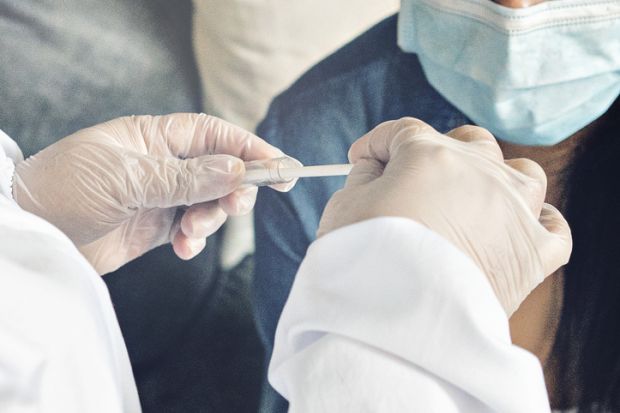Some UK universities will struggle to put plans for mass pre-Christmas coronavirus testing of students into action, vice-chancellors have warned.
Michelle Donelan, the universities minister, wrote to English sector leaders last week to say that campuses would be provided with free self-administered Covid tests to be used during a week of mass testing from 30 November to 6 December.
The effort is designed to provide reassurance that students can travel home safely during a week of staggered departures, from 3 to 9 December.
However, vice-chancellors told Times Higher Education that, while they welcomed the support for more testing, it presented many challenges.
One university leader said that “the logistics here are extremely demanding. Most large universities will struggle to test numbers at the speed which the very tight timescales demand.
“We are engaging very positively with this, because we think the learning for January and beyond will be worth it, but government is clearly moving at huge speed and – inevitably – there will be lots of very loose ends.”
Sir David Bell, vice-chancellor at the University of Sunderland, said that many institutions faced a choice over whether to participate in the testing programme.
“For some, with a majority of commuter students, this will not make sense,” he said. With almost 85 per cent of its students commuting, Sunderland is not participating but it will move all teaching online from 9 December, as instructed.
For those universities with a large number of residential students “it could be a formidable undertaking”, Sir David continued.
“Therefore, it may be preferable in such cases to use the ‘student travel window’ to disperse students home without the logistics of setting up a testing centre,” which would be significant, as the government had indicated that centres could require about 40 to 50 staff to run them, he said.
The Unison union has warned that staff will need training and support to deliver tests, while Universities UK has called for “clear assurance of the effectiveness of the tests as well as further details from the government on specific responsibilities under the proposed scheme including the governance, indemnity, resourcing and costs recovery”.
The Welsh and Scottish governments are also planning to make use of asymptomatic testing as part of their plans to get students home for Christmas.
Colin Riordan, vice-chancellor of Cardiff University, agreed that mass testing was a good idea but that there was a question mark over the logistics of it.
“You would have to mobilise pretty rapidly…it’s quite a big job to do. You need to have a booking system, for example,” he said.
Universities that have already set up their own screening services would be at an advantage, Professor Riordan said. Cardiff’s asymptomatic screening service has been working well, with no positives found on the most recent day of testing, Professor Riordan added.
“Large-scale asymptomatic testing can help reduce the rate of transmission and suppress the spread of the virus,” he said. “If this is done right, it could really help.”
Register to continue
Why register?
- Registration is free and only takes a moment
- Once registered, you can read 3 articles a month
- Sign up for our newsletter
Subscribe
Or subscribe for unlimited access to:
- Unlimited access to news, views, insights & reviews
- Digital editions
- Digital access to THE’s university and college rankings analysis
Already registered or a current subscriber? Login








